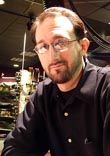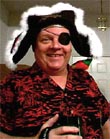|
|
This topic comprises 2 pages: 1 2
|
|
Author
|
Topic: Arthur C. Clarke - 1917 - 2008
|
Bobby Henderson
"Ask me about Trajan."

Posts: 10973
From: Lawton, OK, USA
Registered: Apr 2001
|
 posted 03-18-2008 05:50 PM
posted 03-18-2008 05:50 PM




News Link
quote:
Sci-fi guru Arthur C. Clarke dies at 90
Longtime Sri Lanka resident wrote more than 100 books, including ‘2001’
Breaking news
MSNBC staff and news service reports
updated 24 minutes ago
COLOMBO, Sri Lanka - Arthur C. Clarke, a visionary science fiction writer who won worldwide acclaim with more than 100 books on space, science and the future, died Wednesday in his adopted home of Sri Lanka, an aide said. He was 90.
Clarke, who had battled debilitating post-polio syndrome since the 1960s and sometimes used a wheelchair, died at 1:30 a.m. local time after suffering breathing problems, aide Rohan De Silva said.
Clarke moved to Sri Lanka in 1956, lured by his interest in marine diving — which he said was as close as he could get to the weightless feeling of space. “I’m perfectly operational underwater,” he once said.
Clarke's best-known novel, "2001: A Space Odyssey," became the basis of the 1968 film of the same name, directed by Stanley Kubrick. The film and the book elevated the plot's mentally unbalanced computer, HAL 9000, into the pantheon of great fictional characters.
Three "2001" book sequels followed, and one of them — "2010" — was made into a movie as well.
In addition to the "2001" series, Clarke's best-known works included "Childhood's End" and "Rendezvous With Rama." The latter novel is reportedly being adapted for film, with actor Morgan Freeman as producer and star.
Clarke was regarded as a technological seer as well as a science-fiction writer. He was credited with the concept of communications satellites in 1945, decades before they became a reality. Geosynchronous orbits, which keep satellites in a fixed position relative to the ground, are called Clarke orbits.
Another novel of his, titled "The Fountains of Paradise," sparked the real-world efforts to build a space elevator from Earth to orbit.
He joined American broadcaster Walter Cronkite as a commentator on NASA's Apollo moonshots in the late 1960s.
Clarke was born in 1917 in the English coastal town of Minehead, the eldest of four children. Although he spent his early years in Britain, Sri Lanka was his adopted home. On the occasion of his 90th birthday last December, one of Clarke's three wishes was to see lasting peace in the island nation, which has been divided by ethnic conflict.
Clarke also wished that the world would embrace cleaner energy resources — and that extraterrestrial beings would "call us or give us a sign."
"We have no way of guessing when this might happen," Clarke said in his birthday speech. "I hope sooner rather than later."
This report includes information from The Associated Press and msnbc.com. Check back for updates on this breaking-news story.
© 2008 MSNBC Interactive
Talk about a double-whammy in terms of tragedy for the film industry today. I was still thinking about Anthony Minghella (director of The English Patient) and the tragic circumstances of his death. Now this. Wow. 2001: A Space Odyssey made Clarke's name well known with the general public. The enduring nature of that classic film will also keep his memory alive for generations to come.
| IP: Logged
|
|
|
|
|
|
|
|
|
|
|
|
|
|
|
|
Mark Ogden
Jedi Master Film Handler
Posts: 943
From: Little Falls, N.J.
Registered: Jun 99
|
 posted 03-19-2008 10:11 AM
posted 03-19-2008 10:11 AM




. . . and then he made the mistake of failing to patent the idea, losing out on what he once estimated to be nearly a billion dollars. He once claimed in an article that a patent attorney dissuaded him from the idea, calling the whole idea of satellites ludicrous.
As the last living member of science fiction’s so-called “Big 3” (Azimov and Heinlien being the other two), I’m sorry to hear he’s gone. I first started reading SF in the late fifties, back when my hometown library issued me a “juvenile card” (J66640 was my number, how’s that for memory). I started out on Clarke’s Pebble in the Sky, The City and the Stars and Prelude to Space, along with Heinlien’s Rocketship Galieo, The Star Beast, Podakyne of Mars and Citizen of the Galaxy, and then went on to read Andre Norton, James Blish, Robert Sliverburg, Ray Bradbury and many more before being completely blown away by 2001. All these writers were my childhood literary heroes, and they provided a great escape for a kid growing up in small-town Cold War America.
| IP: Logged
|
|
|
|
|
|
|
|
|
|
Brian Michael Weidemann
Expert cat molester

Posts: 944
From: Costa Mesa, CA United States
Registered: Feb 2004
|
 posted 03-19-2008 09:43 PM
posted 03-19-2008 09:43 PM





It's been a long, long time since I've seen 2001 the film. But as I recall, it's very slow in many parts, and doesn't explain too much of the weird stuff going on. I can sympathize with the position that it's dull and a waste of time. I don't recall being enthralled.
The book, however, can and does deliver a richer explanation and narrative, especially as the follow-up books revisit and elaborate.
My friend didn't like the film because of such sequences as "the guy runs around the spaceship for hours, and they shot every second of it", and things like that. Well, space travel is a long and arduous experience. Kubrick reflected that. ![[Wink]](wink.gif)
| IP: Logged
|
|
|
|
|
|
All times are Central (GMT -6:00)
|
This topic comprises 2 pages: 1 2
|
Powered by Infopop Corporation
UBB.classicTM
6.3.1.2
The Film-Tech Forums are designed for various members related to the cinema industry to express their opinions, viewpoints and testimonials on various products, services and events based upon speculation, personal knowledge and factual information through use, therefore all views represented here allow no liability upon the publishers of this web site and the owners of said views assume no liability for any ill will resulting from these postings. The posts made here are for educational as well as entertainment purposes and as such anyone viewing this portion of the website must accept these views as statements of the author of that opinion
and agrees to release the authors from any and all liability.
|

 Home
Home
 Products
Products
 Store
Store
 Forum
Forum
 Warehouse
Warehouse
 Contact Us
Contact Us




 Printer-friendly view of this topic
Printer-friendly view of this topic








![[Frown]](frown.gif)

![[thumbsup]](graemlins/thumbsup.gif) Now I'm looking forward to the Morgan Freeman project.
Now I'm looking forward to the Morgan Freeman project.





![[Wink]](wink.gif)




